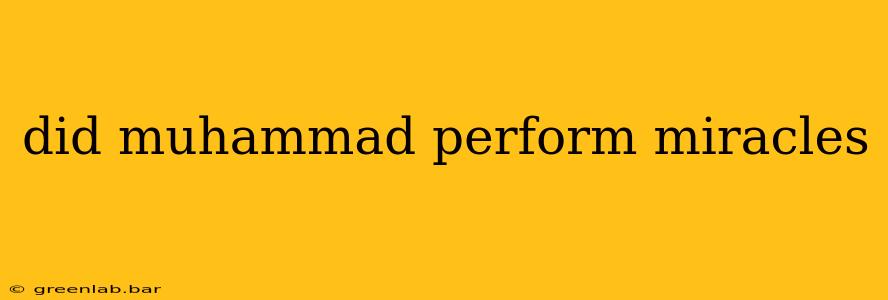The question of whether the Prophet Muhammad performed miracles is a complex one, central to Islamic faith and subject to diverse interpretations within and outside of Islam. This exploration delves into the historical accounts, theological perspectives, and critical analyses surrounding this topic.
The Islamic Perspective on Miracles (Mu'jizat)
In Islam, miracles—referred to as mu'jizat—are not simply extraordinary events but are defined as supernatural occurrences that serve as divine proof of prophethood. Crucially, these events are understood as divinely ordained and directly linked to a prophet's mission, serving as irrefutable evidence of their divine authority. They are not performed for personal gain or worldly advantage, but to validate their message and call to faith.
The Quran itself describes numerous miracles attributed to previous prophets, such as Moses's parting of the Red Sea and Jesus's healing of the sick. The concept of mu'jizat is therefore deeply embedded within the theological framework of Islam.
Accounts of Miracles Attributed to Muhammad
Islamic traditions recount several events attributed to Muhammad as mu'jizat. These accounts, primarily found in Hadith collections (compilations of sayings and actions of Muhammad), often lack the detailed descriptions found in historical accounts of other purported miracles. Some commonly cited examples include:
- The Splitting of the Moon: This event, described in some Hadith, is frequently cited as a significant miracle. However, the accounts vary in detail, and there's no independent corroboration from non-Islamic sources.
- The Miraculous Night Journey (Isra and Mi'raj): This account describes Muhammad's journey to Jerusalem and ascension to heaven. While central to Islamic belief, the historicity of this event is debated. The focus often lies on its spiritual significance rather than its miraculous nature in a purely physical sense.
- Healing and other acts of divine intervention: Several Hadith recount instances of Muhammad's intercession leading to healing or other beneficial outcomes. These accounts are often interpreted as manifestations of divine power acting through him, rather than inherent miraculous abilities.
Critical Examination and Diverse Interpretations
It's crucial to approach these accounts with critical analysis:
- Source Reliability: The reliability of Hadith varies considerably. Scholars engage in rigorous scrutiny to assess the authenticity and chain of transmission of each Hadith. The acceptance or rejection of specific accounts often depends on the scholarly methodology employed.
- Interpretation and Context: The interpretation of these accounts differs even among Muslim scholars. Some emphasize the literal truth of these events, while others focus on their symbolic and spiritual meaning. The context in which the narratives emerged and their cultural significance need to be considered.
- Lack of Independent Verification: Unlike some historical accounts of miracles from other religions, many narratives attributed to Muhammad lack independent corroboration from non-Islamic sources. This absence significantly impacts the historical verification process.
Conclusion: A Matter of Faith and Interpretation
The question of whether Muhammad performed miracles ultimately rests on faith and interpretation. Within Islam, the belief in mu'jizat is integral to the affirmation of prophethood. However, from a purely historical and scientific perspective, the lack of verifiable evidence necessitates a nuanced approach. The acceptance or rejection of these accounts depends on one's worldview, faith, and the methodology employed in analyzing historical and religious texts. This discussion highlights the importance of critical analysis and understanding the various perspectives on these significant events.

